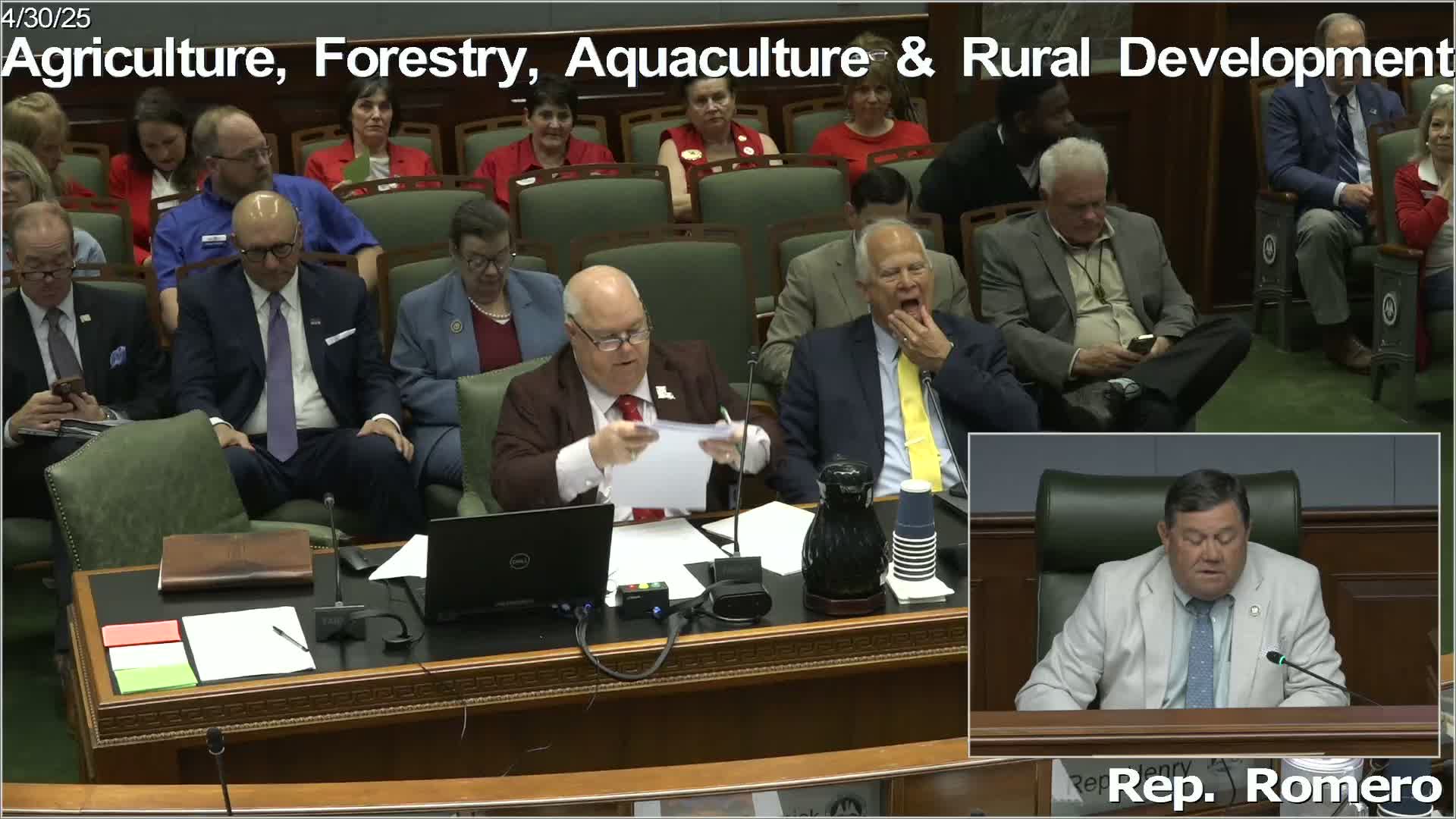Committee asks state agriculture agency to study federal meat-processing exemption; substitute resolution reported favorably
Get AI-powered insights, summaries, and transcripts
Subscribe
Summary
The House Agriculture Committee voted to report favorably a substitute resolution asking the Louisiana Department of Agriculture and Forestry to study a federal proposal intended to ease operations for small meat processors and return with recommendations after one year.
The House Committee on Agriculture, Forestry, Aquaculture, and Rural Development on April 30 voted without recorded objection to report favorably a substitute resolution—identified during the hearing as HCR 21—urging the U.S. Congress and asking the commissioner of the Louisiana Department of Agriculture and Forestry (LDAF) to study the federal Processing, Revival, and Intrastate Meat Exemption Act and recommend steps to help small meat processors in Louisiana.
The substitute resolution asks the commissioner and LDAF staff to evaluate how the federal proposal and other measures might enhance operations for small and custom meat processors and to report back to the legislature within a year. Representative Owen, who introduced the resolution at the hearing, said the study was prompted by a small meat processor in Vernon Parish who has built a local business in New Llano but faces constraints tied to federal and state inspection rules.
Commissioner Mike Strain (Louisiana Department of Agriculture and Forestry) told the committee that federal law gives the U.S. Department of Agriculture (USDA) primacy over amenable species (beef, pork, chicken and similar proteins) under the Federal Meat Inspection Act and that Louisiana operates a mix of federal plants, state‑inspected plants and smaller custom‑exemption facilities under a cooperative agreement with USDA. “The federal government pays 100% of the cost [for federal inspection] … state inspection, the federal government pays 50% of the cost,” Strain said, describing the inspection tiers and how meat from federally inspected plants can enter interstate commerce while custom‑exemption plant product generally returns to the owner or is sold only at the processing site in limited retail quantities. He outlined the scale in Louisiana: 32 custom‑exemption plants (23 that perform slaughter), and 15 state‑inspected slaughter plants.
Strain and members discussed practical limits for small operators. Strain said the economics of inspection mean operators generally need a minimum throughput to justify an assigned inspector; he estimated that “you’re probably not going to be able to afford an inspector at a kill rate of 5 per day” and suggested a rough practical threshold “probably 20 or more” head per day to justify inspector cost. He also gave engineering and cost estimates for facilities: USDA‑approved mobile slaughter units roughly $250,000–$300,000; a new state‑inspected slaughter plant $5–10 million; a federal plant $15–20 million, depending on infrastructure and sanitation systems required to meet federal standards.
During consideration, members asked whether a small custom plant could sell to restaurants or in limited retail on‑site; Strain explained that on‑site restaurant processing or retail at the site is allowed under current state and federal rules but custom‑exemption plants cannot put product into broader commerce without meeting state or federal inspection standards. He said retrofitting an older facility to meet state standards is possible but has to be evaluated case‑by‑case.
A representative of industry testified in opposition to the resolution as originally drafted but welcomed the study. Josh Yarborough, director of food safety for Manda Fine Meats and a representative of the Louisiana Meat Processors Association (LAMPFA), told the committee that federally inspected plants and many state‑inspected plants already must comply with extensive federal requirements, and he listed statutes and standards his members follow: the Federal Meat Inspection Act, Hazard Analysis and Critical Control Points (HACCP), pathogen‑reduction standards, the Humane Methods of Slaughter Act, and food‑labeling regulations. Yarborough said processors want balanced regulation that protects food safety and public health and expressed concern about unintended consequences if exemptions were expanded without study.
Representative Owen said he had changed the resolution to request a yearlong study by the commissioner and that if the study showed a need to press Congress later he would revisit a direct request to Congress. After discussion Representative Butler (vice chair) moved the substitute be reported favorably; there was no recorded objection and the substitute was reported favorably to the full House committee.
The committee did not adopt a new regulatory regime or change inspection rules; it voted to refer the substitute resolution and to ask LDAF for a study and recommendations.
For now, no legislative change was adopted. The resolution's referral to LDAF is a step that will produce a report to the committee on the feasibility, costs, and public‑safety implications of changes urged by the federal Processing, Revival, and Intrastate Meat Exemption Act and related proposals.
The committee hearing included multiple follow‑up questions from members about staffing, inspector costs, where small processors sell product, and whether federal funding programs exist to retrofit plants; Commissioner Strain said a federal retrofit program existed recently but the round of that funding has expired and would require new congressional appropriations to be available again.
Votes at a glance: the committee voted to report the substitute resolution favorably (motion to report favorably adopted; no recorded objections).
